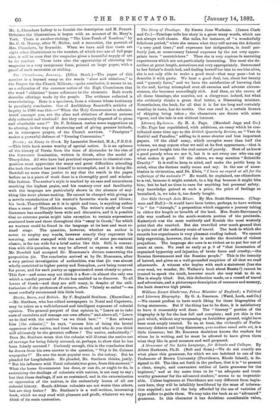Persia ; an Essay in Greek. By Lancelot Dowdall, MA.,
F.R.G.S. —This little book seems worthy of special notice. It is an epitome of the history of Persia from the time of Alexander to the rise of the Saracenie domination, written in Greek, after the model of Thncydides. All who have had practical experience in classical com- position must appreciate the many and great difficulties attending the task the author has set himself to accomplish, and it is doing Mr. Dowdall no more than justice to say that the result in the pages before us is a piece of work done in a thoroughly good and scholar- like fashion. The author's style is marked by an ease and naturalness meriting the highest praise, and his mastery over and familiarity with the language are particularly shown in the absence of any- thing like mere phrase-making. He cannot be charged with giving us
servile reproduction of his master's favourite words and idioms ; his book, Thncydidean as it is in spirit and tone, is anything rather than a canto of Thncydidean scraps. The writer's study of Greek literature has manifestly been wide and discursive, and it is possible that an extreme purist might take exception to certain expressions scattered here and there throughout this " essay in Greek," for which no warrant could be found in the language at its best and most re-
fined stage. The question, however, whether an author is sever to employ any words, however exactly they represent his mauling, unless stamped with the authority of some pm-eminent classic, is far too wide for a brief notice like this. Still, in connec- tion with this question, we may be allowed to express a wish that Mr. DowdaU had accepted Dr. Mommsen's dictum concerning the preposition /es. The conclusion arrived at by Dr. Mommsen, after a very patient investigation of authorities, was that /la, was almost wholly restricted to higher poetry and Xenophon, aerit being reserved for prose, and for such poetry as approximated most closely to prose. 'This flaw—and some may not think it a flaw—is almost the only one which a careful perusal of Persia has enabled us to discover. To all lovers of Greek—and they are still many, in despite of the utili- tarianism of the professors of science, often "falsely so called"—we most cordially recommend this little book.






































 Previous page
Previous page